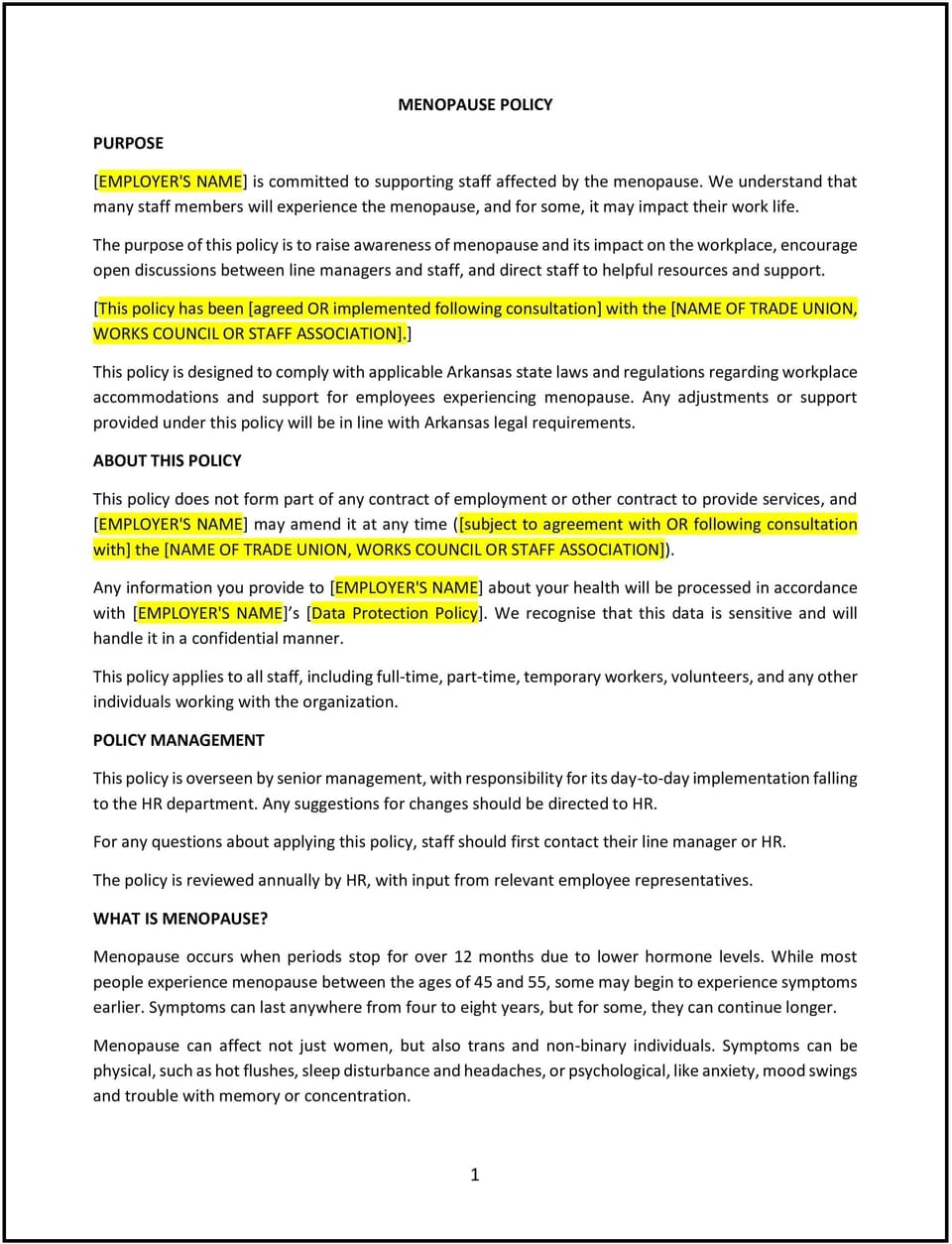Menopause policy (Arkansas): Free template

Menopause policy (Arkansas)
In Arkansas, a menopause policy provides businesses with a framework to support employees experiencing menopause-related challenges. This policy outlines the business’s commitment to creating an inclusive and supportive work environment, accommodating employee needs while maintaining productivity and compliance with applicable laws.
This policy addresses workplace adjustments, employee resources, and communication practices to foster understanding and inclusivity. By adopting this policy, Arkansas businesses can enhance employee well-being, reduce stigma, and promote a respectful workplace culture.
How to use this menopause policy (Arkansas)
- Promote awareness: Educate employees and managers about menopause to reduce stigma and foster a supportive environment.
- Provide accommodations: Offer workplace adjustments, such as flexible scheduling, temperature control, or private spaces, to support employees managing symptoms.
- Establish communication channels: Create an open environment where employees feel comfortable discussing needs or concerns with managers or HR.
- Offer resources: Provide access to employee assistance programs (EAPs), healthcare resources, or wellness initiatives tailored to menopause-related challenges.
- Monitor inclusivity: Regularly review workplace practices to ensure they align with the policy’s goals of inclusivity and support.
Benefits of using this menopause policy (Arkansas)
This policy offers several advantages for Arkansas businesses:
- Promotes inclusivity: Creates a workplace culture that respects and supports employees experiencing menopause.
- Enhances employee retention: Demonstrates the business’s commitment to employee well-being, fostering loyalty and reducing turnover.
- Supports compliance: Aligns with Arkansas employment laws and federal anti-discrimination regulations, minimizing legal risks.
- Reduces absenteeism: Provides accommodations to help employees manage symptoms, improving attendance and productivity.
- Builds workplace morale: Encourages open communication and understanding, promoting a positive and respectful work environment.
Tips for using this menopause policy (Arkansas)
- Address Arkansas-specific considerations: Ensure the policy aligns with state employment laws and reflects local workforce dynamics.
- Train managers: Provide training on recognizing menopause-related challenges and offering appropriate support without bias or judgment.
- Incorporate flexibility: Allow adjustments, such as remote work or flexible hours, to accommodate individual needs.
- Gather feedback: Encourage employees to share suggestions for improving workplace support for menopause-related concerns.
- Review regularly: Update the policy to reflect changes in workplace practices, laws, or employee needs.
Q: How does this policy benefit the business?
A: This policy fosters an inclusive workplace, supports employee well-being, reduces absenteeism, and aligns with Arkansas and federal anti-discrimination laws, improving employee retention and productivity.
Q: What specific adjustments can the business offer under this policy?
A: Adjustments may include flexible work hours, remote work options, temperature-controlled workspaces, access to private areas, and support through wellness programs or employee assistance initiatives.
Q: How does this policy ensure compliance with Arkansas laws?
A: The policy aligns with state employment regulations and federal anti-discrimination laws, ensuring lawful workplace practices while addressing employee needs.
Q: What steps should the business take to create a supportive environment?
A: The business should provide manager training on menopause-related challenges, establish clear communication channels, and promote awareness to reduce stigma.
Q: How can the business evaluate the effectiveness of this policy?
A: The business can gather feedback from employees, monitor the implementation of accommodations, and periodically review workplace practices to ensure inclusivity and policy alignment.
This article contains general legal information and does not contain legal advice. Cobrief is not a law firm or a substitute for an attorney or law firm. The law is complex and changes often. For legal advice, please ask a lawyer.


